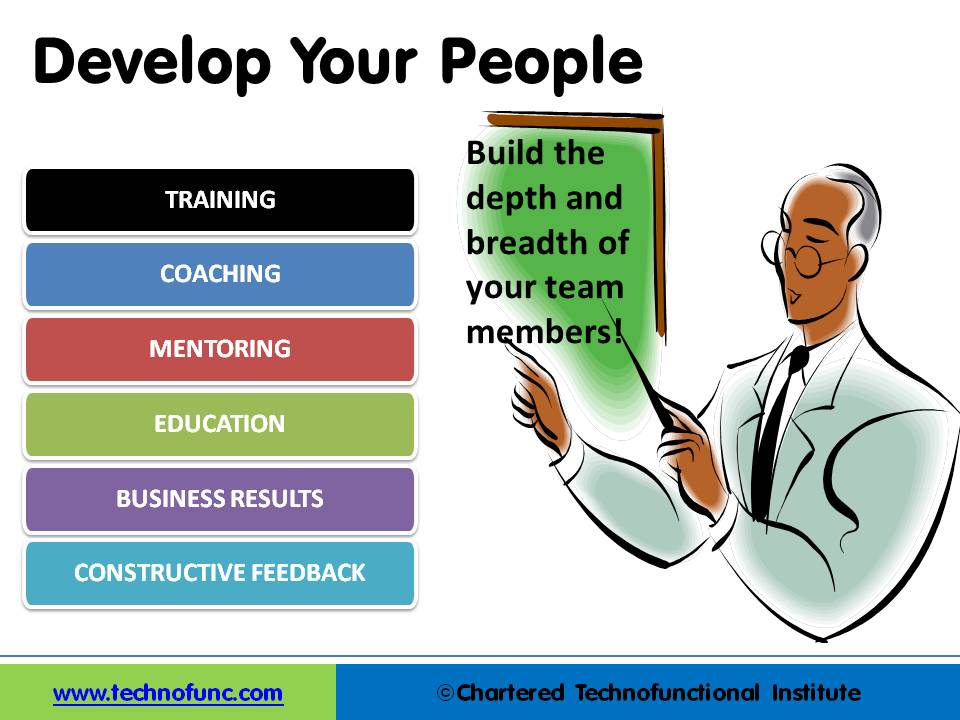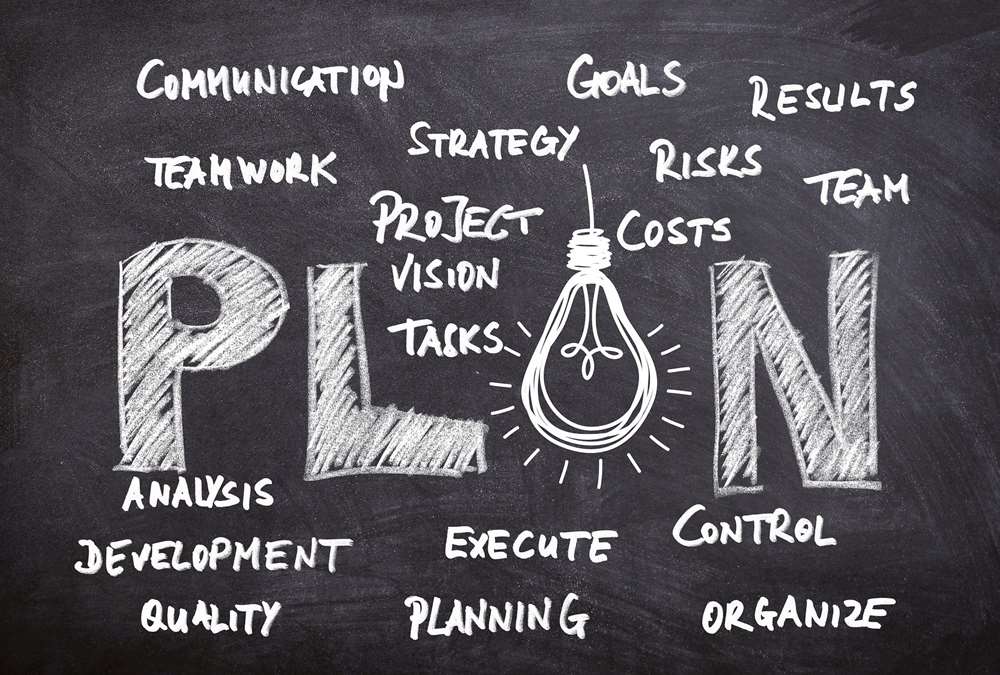- Home
- Business Processes
- Industry Knowledge
- Aerospace Industry
- Automotive Industry
- Banking Domain
- BFSI Industry
- Consumer/ FMCG Industry
- Chemicals Industry
- Engineering & Construction
- Energy Industry
- Education Domain
- Finance Domain
- Hospitality Domain
- Healthcare Industry
- Insurance Domain
- Retail Industry
- Travel and Tourism Domain
- Telecom Industry
- Leadership Skills
- eLearning
- Home
- Leadership Skills
- Project Leadership
- Tools for Developing Your Team
Tools for Developing Your Team
If a manager has too many weak spots in the talent of the team, the ability to empower the team members to independently execute the project is impaired. Assignments fall behind schedule or stretch out because the needed skills or knowledge are not in place when needed. To successfully execute important projects, hiring talented people, and increasing the talents of existing staff are most important.
Continuous Development of the Team
Continued focus on the development of the team helps to put the manager in a position to pursue important assignments and build the confidence that the team is prepared for the task at hand. Your confidence on your people is the key to empower people. Learning culture is an environment that supports an open mindset, an independent quest for knowledge, and embraces shared learning directed toward the mission and goals of the organization. Companies with continuous learning cultures enjoy a number of benefits, including:
- They are 46 percent more likely to be first to market
- They experience 37 percent higher productivity
- They are 92 percent more likely to innovate
Importance of Training & Coaching
Creating depth requires a commitment to growing people. The manager cannot wave a magic wand and all of a sudden get high-performance. You need to develop your team using different techniques like training, mentoring and coaching and formal education. There is a much-underused resource company can leverage to complete their transition toward a continuous learning culture: peer coaching. If implemented correctly, a continuous learning culture based on peer coaching can drive performance, boost employee engagement, and develop future leaders.
Take Every Assignment as a Learning Opportunity
This depth of professionals comes about by seeing every project or assignment as having learning opportunities within. Projects and tasks provide a platform to do the work and grow at the same time. By building well-trained people, you have automatic trainers within the team. Mentors are created on their own. Once your people develop and grow, empowering them becomes easy. The rapid change in business and organizations means everyone needs to constantly be learning. More and more people are looking for options on their own because they aren’t getting what they need from their employers.

Understand the Big Picture
Once empowered, to make the right decisions, people must understand how the company generates money, what the expenses are, and how it makes a profit. To achieve this, share the key financial data and provide meaningful explanations of these figures. Show people how their jobs are tied to these results and how empowered performance can have a positive impact on the numbers. Team leaders should help their direct reports connect their learning goals to wider company objectives and ensure that team members have the time and resources they need to reach their goals. Start building your team’s business process understanding by leveraging technofunc’s functional training. Whether the learner is a team leader or team member, or both, they will learn how to be effective team players and team leaders, solve problems, and work towards common goals via highly interactive case studies, exercises, and use of TechnoFunc resources.
Feedback is Important
The ability to give effective feedback is a powerful skill, yet it is underdeveloped in new managers. Giving effective feedback involves a combination of several key skills that managers need — the ability to observe, communicate, and listen. Helping future leaders develop those skills early on will ensure they are prepared to coach their teams. Provide frequent feedback so that people know how they are doing. Apart from rewards and recognition, people deserve your constructive feedback so that they can continue to develop their knowledge and skills.
Explore Technofunc Toolkit for Team Development
Technofunc resources aim at bridging the gap between technical and functional expertise and have invested a lot of effort into creating tutorials on various business processes and industry knowledge. Our curriculum is designed to equip a person to leverage technology as well as learn critical business application processes along-with system integrity and security, systems audit, project management, and other key methods widely used today that helps in the integration of business processes and practices in tune with the requirements that are driven both by business, globalization and legislature. We can help your team gain expertise in both technical and functional skills, which when applied collectively comprise of professional competence and excellence.
Given below are the different technofunc resources to start building your skills:
Build Domain Skills
- Aerospace Domain
- Automotive Domain
- Banking Domain
- BFSI Domain
- Consumer / FMCG Domain
- Chemicals Domain
- Engineering and Construction Domain
- Energy Domain
- Education Domain
- Financial Management & Business Dynamics
- Global Markets Domain
- Hospitality and Leisure Domain
- Healthcare Domain
- Insurance Domain
- Technology Domain
- Retail Domain
- Travel Domain
- Telecom Domain
“The difference between great people and everyone else is that great people create their lives actively, while everyone else is created by their lives, passively waiting to see where life takes them next. The difference between the two is the difference between living fully and just existing.”
- Michael E. Gerber
Related Links
You May Also Like
-
Tools for Developing Your Team
If a manager has too many weak spots in the talent of the team, the ability to empower the team members to independently execute the project is impaired. Assignments fall behind schedule or stretch out because the needed skills or knowledge are not in place when needed. To successfully execute important projects, hiring talented people, and increasing the talents of existing staff are most important.
-
“Level 5 Leadership”, this term was coined by Jim Collins in his book “Good to Great” and it is all about achieving "Greatness" as a leader. This article will explain what we mean by Level 5 Leadership and what the characteristics of a Level 5 leader are. What it takes to achieve greatness as a leader, and what are the steps and strategies that one can use to move up to this top level of leadership.
-
In our present Hitech scenario, society is changing very fast. What are the skills that are most relevant for leaders in relation to the changing economic environment? Leaders need to develop skills to drive innovation and change in order to play a more central role in their organizations’ activities. How do managers accept the change and meet business expectations by becoming a key figure in driving change and innovation?
-
Team Development by Building Trust
As your team begins to work together, you need to establish a way each team member can exchange ideas and build mutual trust. Successful groups are built on trust and collaboration. A free exchange of ideas, in an open environment, will allow your team to get to know each other and enable you to check on how they work together. Learn some tips to help build team trust and establish personal bonds.
-
Evidence of the medically damaging symptoms of work stress necessitates applying the treatment of stress management. Stress management is increasingly drawing the attention to the management experts not only as a remedial measure but also as a way to resource management. If the workplace can be made a little more lovable the increase in the achievement of the organization may be much time more. If group stress can be removed by introducing group discussions and recreational facilities a long-lasting team spirit may get developed.
-
Time management is the process of planning and exercising conscious control of time spent on specific activities, especially to increase effectiveness, efficiency, and productivity. The best time management techniques improve the ways you work. Time management refers to managing time effectively so that the right time is allocated to the right activity. Learn more about the five steps for effective time management viz. study, identify, analyze, decide, and implement.
-
Narrative leadership is interpreted as the leader who aspires to construct leadership by telling stories. Leadership is a task of persuasion, of winning people’s minds and hearts. Storytelling is thus inherently suited for the task of leadership. Learn about the narrative leadership style and how to use this style to inspire and motivate followers or to manage change.
-
Robert Katz identified three leadership skills called - technical skills, human skills, and conceptual skills as the basic personal skills essential for leadership. Leaders must possess these three skills that assist them in optimizing a leader's performance. Technical skills are related to the field, human skills are related to communicating with people and conceptual skills related to setting the vision.
-
The best career choices are ones that match your values. Each person has several values that are important to him. These values are highly personal and knowing them provides a clearer sense of what's most important to you in your life and career. Career values are the beliefs you consider important from a work standpoint. Values help you understand what you want from a job? Explore a few examples of work values that can influence career path and job satisfaction.
-
A good leadership style is something that every effective leader must have in order to succeed, but identifying what that entails or does not entails might be difficult to understand. Most of the research on leadership focuses on the exemplary, best practices, and positive attributes of effective and successful leaders. This article talks about a new approach to learn leadership using lessons from bad leadership. That is the lessons to be learned by examining leaders who have not effectively exercised their power, authority, or influence.
Explore Our Free Training Articles or
Sign Up to Start With Our eLearning Courses

About Us
Learning
© 2023 TechnoFunc, All Rights Reserved










